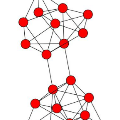The development of global positioning system stimulates the popularity of location-based social network (LBSN) services. With a large volume of data containing locations, texts, check-in information, and social relationships, spatial keyword queries in LBSNs have become increasingly complex. In this paper, we identify and solve the Social-based Time-aware Spatial Keyword Query (STSKQ) that returns the top-k objects by considering geo-spatial score, keywords similarity, visiting time score, and social relationship effect. To tackle STSKQ, we propose a two-layer hybrid index structure called Network Embedding Time-aware R-tree (NETR-Tree). In the user layer, we exploit the network embedding strategy to measure the relationship effect in users' relationship network. In the location layer, we build a Time-aware R-tree (TR-tree) considered spatial objects' spatiotemporal check-in information, and present a corresponding query processing algorithm. Finally, extensive experiments on two different real-life LBSNs demonstrate the effectiveness and efficiency of our methods, compared with existing state-of-the-art methods.
翻译:全球定位系统的发展刺激了基于位置的社会网络服务的普及性。随着包含位置、文本、登录信息和社会关系的大量数据,LBSNS空间关键词查询变得日益复杂。在本文中,我们确定并解决基于社会的时间觉空间关键字查询(STSKQ),该关键字查询通过考虑地理空间分、关键字相似性、访问时间分数和社会关系效应,返回了最顶端物体。为了处理STSKQ,我们建议建立一个名为网络嵌入时间觉R-Tree(NETR-Tree)的双层混合指数结构。在用户层,我们利用网络嵌入战略来衡量用户关系网络的效果。在定位层,我们建立了一个时间觉R-Tree(TR-Tree),考虑空间物体的波段边检信息,并提出了相应的查询算法。最后,对两种不同的现实生活惯用 LBSNSS进行广泛的实验,展示了我们方法的有效性和效率,与现有的状态方法相比。




